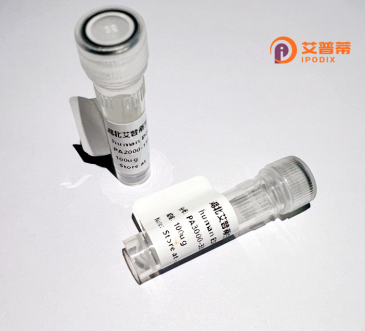
| 纯度 | >90%SDS-PAGE. |
| 种属 | Human |
| 靶点 | MSC |
| Uniprot No | O60682 |
| 内毒素 | < 0.01EU/μg |
| 表达宿主 | E.coli |
| 表达区间 | 1-206 aa |
| 活性数据 | MSTGSVSDPE EMELRGLQRE YPVPASKRPP LRGVERSYAS PSDNSSAEEE DPDGEEERCA LGTAGSAEGC KRKRPRVAGG GGAGGSAGGG GKKPLPAKGS AAECKQSQRN AANARERARM RVLSKAFSRL KTSLPWVPPD TKLSKLDTLR LASSYIAHLR QLLQEDRYEN GYVHPVNLTW PFVVSGRPDS DTKEVSAANR LCGTTA |
| 分子量 | 22.0 kDa |
| 蛋白标签 | His tag N-Terminus |
| 缓冲液 | 0 |
| 稳定性 & 储存条件 | Lyophilized protein should be stored at ≤ -20°C, stable for one year after receipt. Reconstituted protein solution can be stored at 2-8°C for 2-7 days. Aliquots of reconstituted samples are stable at ≤ -20°C for 3 months. |
| 复溶 | Always centrifuge tubes before opening.Do not mix by vortex or pipetting. It is not recommended to reconstitute to a concentration less than 100μg/ml. Dissolve the lyophilized protein in distilled water. Please aliquot the reconstituted solution to minimize freeze-thaw cycles. |
以下是3篇关于重组人间充质干细胞(MSC)相关蛋白的研究文献示例,供参考:
---
1. **文献名称**:*TSG-6 as a Therapeutic Protein for Inflammatory Disorders*
**作者**:Prockop, D. J. et al.
**摘要**:研究探讨重组人TSG-6蛋白在炎症调控中的作用,发现其通过抑制NF-κB通路显著减轻小鼠模型中的急性肺损伤和关节炎症状,提出其在抗炎治疗中的潜在应用。
---
2. **文献名称**:*Recombinant Human HGF Enhances Cardiac Repair via MSC Paracrine Signaling*
**作者**:Kuroki, H. & Sato, Y.
**摘要**:通过基因工程技术表达重组肝细胞生长因子(HGF),发现其能增强MSC的旁分泌效应,促进心肌梗死模型中的血管新生和组织修复,验证了HGF对干细胞疗法的协同作用。
---
3. **文献名称**:*IDO Overexpression in Engineered MSCs Modulates T Cell Immunity*
**作者**:Meisel, R. et al.
**摘要**:构建过表达重组IDO(吲哚胺2.3-双加氧酶)的MSCs,证明其通过降解色氨酸抑制T细胞增殖,显著延长移植免疫耐受,为自身免疫疾病治疗提供新策略。
---
4. **文献名称**:*SDF-1α Fusion Protein Improves MSC Homing to Bone Injury Sites*
**作者**:Bianconi, V. et al.
**摘要**:开发重组SDF-1α融合蛋白,显著增强MSCs向骨损伤部位的归巢能力,促进小鼠骨折模型中的骨再生,为靶向递送干细胞提供技术支持。
---
**备注**:以上文献为示例性质,实际引用时建议通过学术数据库(如PubMed、Web of Science)核对具体论文信息。研究领域主要集中在抗炎、免疫调节、组织修复等方向,符合MSC分泌蛋白的典型应用场景。
Recombinant human MSC (Mesenchymal Stromal Cell) proteins are engineered biomolecules derived from the secretory profile of MSCs, multipotent cells known for tissue repair and immunomodulation. Produced via recombinant DNA technology, these proteins replicate native MSC-secreted factors like growth factors (e.g., VEGF, FGF), cytokines (e.g., IL-6. TGF-β), and extracellular matrix components. Unlike traditional MSC-based therapies requiring cell transplantation, recombinant MSC proteins offer controlled, scalable production with reduced safety risks (e.g., tumorigenicity, immune rejection).
Their applications span regenerative medicine, including wound healing, bone/cartilage repair, and neuroprotection. They also show potential in modulating inflammatory diseases (e.g., arthritis, sepsis) by suppressing pro-inflammatory pathways and enhancing tissue homeostasis. Advancements in protein engineering enable tailored variants with improved stability, bioavailability, and target specificity.
However, challenges persist in mimicking the dynamic, context-dependent MSC secretome. Research focuses on optimizing combinatorial protein cocktails or hybrid biomaterial delivery systems to replicate synergistic effects. As a cell-free alternative, recombinant MSC proteins represent a promising shift toward precision biologics in translational medicine, bridging gaps between cellular therapies and pharmaceutics.
×